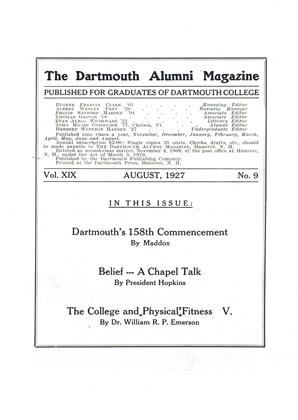On April 8, 1927, a dinner was tendered by the Bar Association of St. Louis to Judge Walter H. Sanborn '67 in appreciation of thirty-five years of distinguished service as United States Circuit Judge. Ernest A. Green, president of the Bar Association of St. Louis, presided as toastmaster and addresses were delivered on behalf of a number of the Bar Associations of the Eighth Circuit. In regretting his inability to be present Chief Justice Taft of the United States Supreme Court said in his letter to the
presiding officer: "This is a most deserved tribute to thirty-five years of the hardest kind of judicial service within a jurisdiction that covers thirteen States and in territory certainly a very large fraction of the whole Union. That service has been of the most valuable character in establishing the Federal and general law of the Eighth Circuit of the United States. Every opinion rendered by Judge Sanborn manifests enormous industry and the most conscientious care in the examination of the law as it has been declared in the authorities and as it should be developed in new occasions for its application. The number of opinions written and announced by Judge Sanborn is not I think equaled in the history of this country. The respect and weight attributed to them by the Bench and B.ar of this country are I am sure a sufficient reward to the Judge for the life's work he has given them. The confidence that he has won in the vast territory ov-er whichvhe exercises jurisdiction is the subject of most frequent comment whenever the members of the Bar from the Eighth Circuit are met."
In behalf of the St. Louis Bar Association Mr. Lionberger spoke in part as follows:
".You have presided over our controversies for thirty-five years, and all this time you have sat in a fiercer light than beats'upon a throne. The bar is a learned and able body, little inclined to flattery, more apt to smart under defeat than admire when it understands, rather critical than fawning; and if, as in the present instance, it is unanimous in its praise, it is because you, sir, have compelled its admiration.
"No sinister motive can be attributed to us. We are too familiar with the cool neutrality of your impartiality to hope for favors. We desire none, sir, at your hands; and if, tonight, with one voice, those among us who have prevailed and those of us who have been defeated before you join in praise of your learning, industry, courage, probity and courtesy, it is because we wish to publicly declare our approbation and render homage where it is due. . . .
"Judge Sanborn has been on the bench during an era of experiment, public excitement and innovation, when the sanctity of the old cases has been relaxed and the old paths could be no longer followed. Innumerable cases involving charters as contracts, the Sherman anti-trust act, laws relating to wages, hours of work, rent of dwellings, the segregation of classes, buying and selling by common agent, the delegation of public authority to commissions and bureaus, inter- and intra-state commerce, the valuation and rates of public utilities, special and confiscatory taxes, rights to flowing waters as between states, the taxation of incomes, conscription and the war powers of the Executive Department, most of which were novel and all perplexing, have had to be disposed of.
"And, in addition to these things he has had to restrain the fanatical outbursts of passion which from time to time swept over this country during the war, and to. reconcile the tyrannies and vexations, the searches and seizures resulting from the Volstead Act, with the rights, privileges, and immunities granted to us by our federal Bill of Rights."
The Newton Cabin
 View Full Issue
View Full Issue
More From This Issue
-
 Article
ArticleDARTMOUTH'S 158TH COMMENCEMENT
August 1927 -
 Article
ArticleTHE COLLEGE AND PHYSICIAL FITNESS V.
August 1927 By William R. P. Emerson, M. D., -
 Article
ArticleJUNE MEETING OF ALUMNI COUNCIL
August 1927 By J. R. Chandler '98, Clarence G. McDavitt '00 -
 Article
ArticleTRUSTEES HOLD MEETING IN HANOVER
August 1927 By Hanover, N. H.,, E. K. Hall -
 Sports
SportsSUMMARY OF ATHLETIC SCORES
August 1927 -
 Class Notes
Class NotesCLASS OF 1921
August 1927 By Herrick Brown
Article
-
 Article
ArticleDARTMOUTH COLLEGE REPRINTS
February 1919 -
 Article
ArticleJOHN P. CARLETON AWARDED RHODES SCHOLARSHIP
January 1922 -
 Article
ArticleWHAT PRICE DEDICATION?
APRIL 1959 -
 Article
ArticleSecretary of the Year
June 1962 -
 Article
ArticleNew Unit of Bio-Medical Center Dedicated
JANUARY 1963 -
 Article
ArticleWith the D.O.C.
October 1947 By JOHN A. RAND '38.


